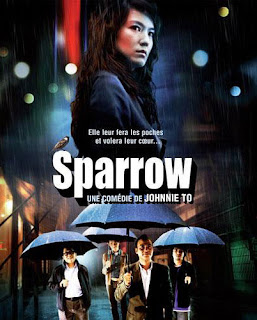Johnnie To can be such a delicate, precise action filmmaker. Consider the ballet on shattered mirrors in Mad Detective; the operatic shootouts in Vengeance that puts Woo to shame. In Sparrow, the filmmaker's most lightweight film in a long time, the uber-prolific To approaches the film with a near lack of gravity. As a result, the stylised film, essentially a crime caper of sorts, is so light - thematically, character wise - it seems to float before your eyes, and I mean that as a compliment.
Being a small time crook doesn’t mean you’re a bad person. Kei (Simon Yam) leads a pleasant life, often meeting with his criminal cohorts in a Hong Kong diner to discuss the day’s activities – a stolen wallet here, a lifted mobile phone there. Often tourists are the most visible, easiest targets. Kei is such a pleasant guy that when a sparrow flies into his apartment, he simply puts his fists in his hips and shakes his head, smiling. But when the beautiful, mysterious Chun Chun Lei (Kelly Lin) shows up, Kei’s world is shaken to its surface (there’s not much of a core). One by one, she coincidentally meets up with each of Kei’s colleagues, which invariably leads to trouble. Then Kei finds out about Chun Chun Lei’s secret, and he has no choice but to get involved in her private life.Kei is a bicycle riding, laid back, reluctant hero; Chun Chun Lei is a stunningly beautiful romantic foil.
To orchestrates some beautiful scenes: Kei’s infatuation with Chun Lei, initially caputred through a lense; a chase sequence that undermines what one expects from chase sequences; a delightful invocation of The Umbrellas of Cherbourg in a rainy showdown. In this film, unlike in many of To’s other, far more brutal films, the villains are as simultaneously weightless and grounded. Towards the film’s end, one cannot help but think of the main villain as an old man whose time has come, and not as a violent killer. To seems to endow Sparrow with a sense of inconsequentiality: for many of the characters, things will remains as they have for a very long time, regardless of what happens.
This is To’s playground, and he’s surprisingly gentle; once we know the players, he directs them towards moments of playful deception and even physical comedy. There’s a romantic subplot but not in the way one might think. Between cleverly choreographed set pieces and some light character work, Sparrow is an eminently rewatchable old school crime flick.



